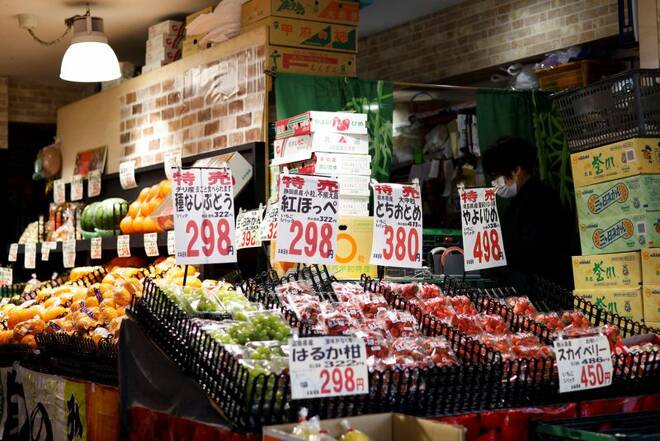Advertisement
Advertisement
Tokyo inflation cools for second month, but exceeds BOJ target
By:
By Takahiko Wada and Leika Kihara TOKYO (Reuters) - Core consumer inflation in Japan's capital Tokyo slowed in March for a second month but remained well above the central bank's 2% target, data showed on Friday, highlighting broadening price pressures in the world's third-largest economy.
By Takahiko Wada and Leika Kihara
TOKYO (Reuters) – Core consumer inflation in Japan’s capital Tokyo slowed in March for a second month but remained well above the central bank’s 2% target, data showed on Friday, highlighting broadening price pressures in the world’s third-largest economy.
A separate index stripping away energy prices rose at the fastest year-on-year pace since 1990, a sign the effect of government subsidies to curb utility bills did little to stem the rising cost of living for households.
The data underscores the challenge incoming Bank of Japan Governor Kazuo Ueda faces in assessing whether recent cost-driven inflation will shift to one backed by solid demand and wage growth as uncertainties cloud Japan’s fragile economy.
While factory output rebounded in February, some analysts warn of mounting downside risks as slumping global demand for technology goods hits the country’s exports.
“With export volumes on track to record the sharpest contraction since the initial outbreak of the pandemic, we still consider it more likely than not that GDP will have contracted in the first quarter and we think it will do again in Q2,” said Marcel Thieliant, head of Asia-Pacific at Capital Economics.
Core consumer prices in Tokyo, a leading indicator of nationwide trends, rose 3.2% in March from a year earlier, compared with a median market forecast for a 3.1% gain.
The pace of increase slowed from a 3.3% gain in February and a nearly 42-year high of 4.3% hit in January, due largely to the effect of government subsidies to curb utility bills.

An index for Tokyo stripping away fresh food and energy prices, which is closely watched by the BOJ as a gauge of demand-side price pressures, was 3.4% higher in March than a year earlier and faster than a 3.1% rise in February.
“Companies aren’t done hiking prices to pass on higher costs. Inflation will probably stay elevated at least during the first half of this year,” said Yoshiki Shike, chief economist at Dai-ichi Life Research Institute.
The prices of more than 5,100 food items are set to rise in April, Teikoku Databank said in a report on Friday, adding that grocery price hikes would likely persist until around October.
For now, households appear to be weathering the pain. Data released on Friday showed retail sales rose 6.6% in February from a year earlier, beating market forecasts for a 5.8% gain, on solid sales at car dealers and department stores.
Separately, factory output rose 4.5% in February from January, better than a forecast 2.7% gain and rebounding from a revised 5.3% drop in January, on easing supply bottlenecks for carmakers.
While manufacturers surveyed by the government expect to increase output in coming months, some analysts warned of risks.
“There’s a bigger risk of a downgrade in manufacturers’ output plans due to weaknesses in the information-technology (IT) sector. Global demand is shifting away from goods towards services, which is bad news for Japan’s export-reliant economy,” Shinke of Dai-ichi Life Research said.
Japan’s economy is finally recovering from the scars of the COVID-19 pandemic after a delay, though risks of a global slowdown and rising food prices hang over the outlook for exports and consumption.
With inflation already exceeding its target, markets are rife with speculation the BOJ could tweak or end yield curve control (YCC) when Ueda succeeds incumbent Haruhiko Kuroda whose second, five-year term ends in April.
YCC aims to control the shape of the yield curve to suppress short- to medium-term rates without depressing super-long yields too much.
“Given uncertainty over the global economic outlook, the BOJ may sustain ultra-loose policy. But there’s a chance it will change the means of keeping monetary policy loose,” such as by tweaking YCC, said Takumi Tsunoda, senior economist at Shinkin Central Bank Research Institute.
(Reporting by Takahiko Wada and Leika Kihara; Additional reporting by Kantaro Komiya; Editing by Sam Holmes, Jacqueline Wong and Jamie Freed)
About the Author
Reuterscontributor
Reuters, the news and media division of Thomson Reuters, is the world’s largest international multimedia news provider reaching more than one billion people every day. Reuters provides trusted business, financial, national, and international news to professionals via Thomson Reuters desktops, the world's media organizations, and directly to consumers at Reuters.com and via Reuters TV. Learn more about Thomson Reuters products:
Advertisement
